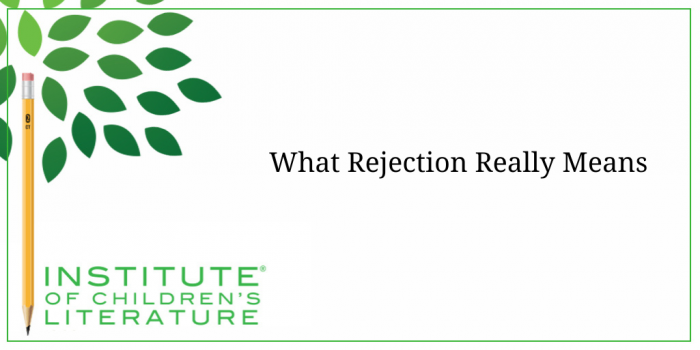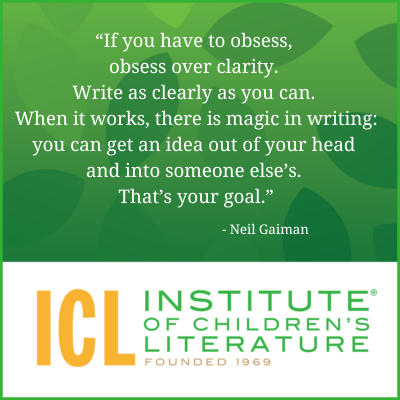1000 N. West Street #1200, Wilmington, DE 19801
© 2024 Direct Learning Systems, Inc. All rights reserved.

Rejection letters make no one giddy with joy, but most of us get far more than we could possibly, ever want. Most of us. Actually, I’ve been told that Paula Danzinger sold her first book without a single rejection. And I sold my first magazine article without a single rejection. It was for a magazine I had read many times so I wrote an article, had a friend shoot photos to go with it, I mailed it off without ever reading the writer’s guidelines), and they bought it and paid me over $1,000. I thought I was God’s gift to magazine writing. I thought I had it made. I was so wrong.

Over the years I’ve figured out something about rejection letters. They all have one thing in common. They really have nothing to do with me personally. I don’t get rejection letter because I stink as a writer. I don’t get rejection letters because I’m chubby or near-sighted or laugh too much. I get rejection letters because the product I produced (a manuscript) didn’t meet the needs and desires of specific people at specific publishers.
They aren’t rejecting my full body of work.
They aren’t rejecting my personality.
They are rejecting a single manuscript for reasons that might be more personal than professional (such as in the instance of the editor cited above – the same manuscript that he waxed so poetic about hating went to acquisitions meetings and landed me an agent. But it rubbed that one editor
firmly the wrong way.)
Rejections are about specific manuscripts in specific situations. That’s why they tend to happen to everyone. Jane Yolen even gets rejections. She doesn’t like them either, but she gets them despite being an exceptionally fine writer.
Actually, rejection letters have something else in common – you are very limited in your ability to control them. You can do certain things to lesson the odds of getting one:

Rejections are not proof that you cannot write. They signify failure ONLY if you let them make you quit writing and submitting. They are only proof that this is a difficult profession we’ve chosen and filled with challenges. We can’t change the challenges, but we can change how we meet them. Think about what great books would be lost forever if these writers allowed rejection to derail them:
Dr. Seuss received many rejections (I found numbers from 27 to 70) before his first book was published.
Jack London had over 200 rejections before he made his first sale.
Madeleine L’Engle’s A Wrinkle in Time collected many rejections (I found numbers from 29 – 45) before it was published.
David Lubar collected about 100 rejections before he ever sold anything.
In an interview with Cynthia Leitich Smith, Gail Carson Levine said, “It took me nine years to get anything published. At the beginning, I mostly wrote picture books, which were rejected by every children’s book publisher in America. Nowadays, when I visit schools, I often read my worst rejection letter to the kids. That letter, which made me miserable at the time, no longer has the power to hurt me. Nowadays, it’s now a prized possession, a symbol for never giving up.”
There is really only one true response to rejection: writing and writing and writing and writing and refusing to give up.
Tim Allen in Galaxy Quest had it right: “Never give up. Never surrender.”
With over 100 books in publication, Jan Fields writes both chapter books for children and mystery novels for adults. She’s also known for a variety of experiences teaching writing, from one session SCBWI events to lengthier Highlights Foundation workshops to these blog posts for the Institute of Children’s Literature. As a former ICL instructor, Jan enjoys equipping writers for success in whatever way she can.
1000 N. West Street #1200, Wilmington, DE 19801
© 2024 Direct Learning Systems, Inc. All rights reserved.
1000 N. West Street #1200, Wilmington, DE 19801
© 2024 Direct Learning Systems, Inc. All rights reserved.
1000 N. West Street #1200, Wilmington, DE 19801
© 2024 Direct Learning Systems, Inc. All rights reserved.
1000 N. West Street #1200, Wilmington, DE 19801
© 2025 Direct Learning Systems, Inc. All rights reserved.
1000 N. West Street #1200, Wilmington, DE 19801
©2025 Direct Learning Systems, Inc. All rights reserved. Privacy Policy.
1 Comment